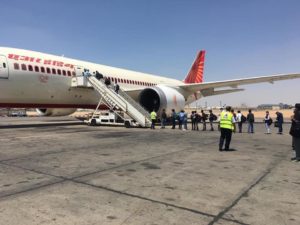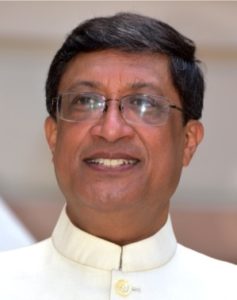Work in progress for PBD 2021 & Know India programme, says MEA
Vande Bharat Mission, touted as the world’s largest repatriation programme, has played a crucial role in bringing about 180,000 Indians stuck abroad back home in view of the pandemic. Sanjay Bhattacharyya, secretary (Consular Passport and Visas & Overseas Indian Affairs) in the Ministry of External Affairs, spoke to Media India Group about the impact of the pandemic on MEA’s activities in various countries, the success of the Vande Bharat Mission and the fate of the other programmes of the ministry vis a vis the diaspora.
How has the coronavirus pandemic impacted the work of the ministry of external affairs especially regarding the diaspora ?
Due to the coronavirus pandemic we have realised that things cannot be the same again and due to the rules of social distancing & less travel, we have to put in a lot of digital effort in our outreach and in order to do that we have to make several changes in the way we communicate with others. For instance, the Prime Minister has had several dialogues with his counterparts across the world digitally. He also hosted a virtual meeting of SAARC leaders a few weeks ago and in a first perhaps for the whole world India and Australia recently had a digital summit meeting between the two Prime Ministers.
We have also had several interactions with my counterparts in many countries and with ambassadors of other countries in India as well as with our ambassadors in the regions that I cover. We also had a G20 and a BRICS meeting in this period.
Throughout this we are focusing on the experiences of different nations with the pandemic and we have also supplied several medicines, notably hydroxychloroquine and paracetamol to different countries since as you know India is the pharmacy to the world.
Another key point covered during these interactions has been the welfare of our diaspora. So during their interactions with various world leaders both the PM and the external affairs minister have emphasised the welfare of the Indian communities living in those countries and requested the foreign leaders to provide them with the necessary assistance. They also spoke of the repatriation of the foreign community members which was both ways as there were also many foreign nationals who were stranded in India and who needed to go back to their homes. And of course, once our own lockdown was being wound up and we began planning our own repatriation, we received very good support from the foreign governments. To a large extent this was the key activity of the ministry both related to the pandemic and its consequences as well as to keep bilateral ties alive and continue the exchanges with other nations.
What about the activities directly related to the diaspora that have been carried out by the ministry or its missions in various countries ?
The diaspora is something that we attach the highest importance to for a variety of reasons that have evolved over the years. What we have done is at two levels. At the mission level, helplines have been set up at each mission and missions that have a large population of the diaspora have designated nodal officers to help the diaspora members.
This became the foundation of our outreach to the diaspora and the support extended to them was either directly or through the community organisations. Despite the terrible crisis, this has been a very heartwarming moment for us to see the way in which the Indian community associations reached out to community members in multiple ways, not only by providing food, shelter or medicines, but also through counselling services which are very important in such difficult times. The other activity for our missions was the repatriation to India under the Vande Bharat Mission. This became a key focus for our missions especially after the lockdown was eased and travel within India had restarted, even if in a limited manner.

National carrier Air India has again played a stellar role in bringing stranded Indians back home (Photo courtesy: MEA)
What are the criteria for selecting people who could fly on priority to India ?
I would like to give a brief background of this. Though it is piloted by the MEA, the Vande Bharat Mission is really a cooperative effort as it involves various other union ministries like home, civil aviation and health as well as the state governments to be sure about the capacities of the states in handling the incoming traffic in terms of health and quarantine so that the incoming passengers can be handled properly by all the state governments. So it is a huge coordinated effort.
The numbers have expanded rapidly over the weeks. We are in the third phase of VBM and now not just Air India or Air India Express are ferrying passengers, but several private sector airlines are also participating, touching 60 nations globally. We also have charter flights.
The objective of the VBM right from the beginning was that the most compelling cases ought to have a priority, these included elderly people, those with serious medical conditions, women including pregnant women, students and even Indian tourists who had been stranded as well as family exigencies of the diaspora. A very large number of these people were Indian workers who had lost their jobs or run out of money. Finally, there were deportees as Indian nationals being sent back by foreign governments for various reasons.
People had to register on the local mission’s website and then it was aggregated. It was on a first come, first served basis provided people met the criteria. All the deportees are already back and have completed their quarantine and gone to their families. We also have lots of cases of people who had been charged with minor offences overseas and have been given amnesty by the foreign governments, notably Kuwait and Malaysia. So in Kuwait, there are about 12,000 persons in all and we hope to bring them all back home in about a week.
How have the other activities of the ministry vis a vis the diaspora been impacted by the pandemic?
At first we were trying to figure out how long it would take for things to come back to normal and how we would be able to conduct our activities, but soon enough it became apparent that it would be a while before things came back to normal. We had scheduled six regional PBDs but none of them could be held. We are now in discussions for three of them and planning to reschedule them as digital PBDs and I think that might be the way forward as it would keep the engagement alive and allow us to discuss issues that are important for the diaspora. We will see if we can organise it sometime during the winter when it might be possible for physical participation.
There were several other activities which were not affected at all. We run a scholarship programme for diaspora children and that is for the children who had joined last year. So they applied and we went through the entire process of selection which in any case is a digital selection process so that was unaffected and we have been able to announce all the 150 awardees of that scholarship. We also do a quiz programme every year called Bharat Ko Jaaniye and that is about to be launched. The final of the quiz coincides with PBD itself, so we will time it in a way so that the final result can be announced then. Bharat Ko Jaaniye will be launched as scheduled.
We also have a programme called Know India programme meant for the youth diaspora and this basically involves four to six groups of young people between the ages of 18-30 years who visit India and are hosted not only in Delhi but also by one of the state governments. So this year we have a strong request from a number of states who are keen to do this. Many of these requests had come before Covid-19 and some have come even after the pandemic. So we are hoping to see whether we could do this. It’s a physical contact programme where people actually come from overseas and they travel to these different states. We are hoping to see that we would be able to do a physical contact programme around November.
Another programme that happens is the Pravasi Teerth Yatra or a pilgrimage for diaspora organised in coordination with the Indian railways. So we have begun the discussion with the Indian Railways because this is something that usually happens in January-February. So we have begun discussions in the anticipation that things would ease out by then.
But of course the big ticket item is PBD 2021 which as of now is scheduled for January of next year. We have worked within the ministry to compress the preparation time to the barest minimum to see whether we can do all the organising in about three months. If three months before we have the conditions right we will go in for a regular PBD. This is not something we can predict at this point of time. If not we can look at some other alternatives for 2021. What we did within the Overseas Indian Affairs division that I look after and which organises the PBD, we have done all the groundwork for the next PBD. We just have to put the bits and all to get this thing done and to compress the preparation time before it. We will wait and see till about October to see whether this can be done at physical level but if it seems that it may not be then we will look at the other options.
Which human interest stories from the VBM can you recall?
The manner in which the Indian communities across the globe have responded to this challenge in reaching out to help a fellow Indian has been truly heartwarming. They not just provided food and shelter but also counselling services. Doctors provided their services and medication free of cost.
Another initiative was regarding the death of diaspora members that have happened during the pandemic. At a time when air services have been curtailed, the manner in which some of these people who have taken the trouble to send bodies back to India is very heartwarming. There was this case of somebody who had passed away in Nigeria. There were no air connections. Then they discovered that there was a connection that was happening through Addis Ababa in Ethiopia and so they tied up with the mission in Addis Ababa and they got the body there on a flight that was unscheduled and then from there to another unscheduled flight into Mumbai. There have been several such cases that show the sentiment of the people which is really so warm and how it comes to the fore at such times.










